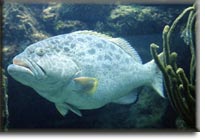 What should we do about overfishing? How can we balance the needs of fish with the needs of fishermen? It's the central dilema of fishery management.
What should we do about overfishing? How can we balance the needs of fish with the needs of fishermen? It's the central dilema of fishery management.Thanks to a few engaged readers we have a blogfish debate in the comments section of: Is the U. S. still overfishing?
Comments center on a (so far) little-known example: persistent overfishing and serious depletion of some groupers and snappers in the U. S. South Atlantic region, in the Atlantic ocean from North Carolina to Florida.
What do you think? When should overfishing be allowed in order to support the economic and social needs of fishermen? Tweet
2 comments:
I notice in this thread (Part 1) and other communications about about fishery management that overfishing and overfished are linked to "unsustainable fisheries". Overfishing and overfished have pretty technical definitions in federal fishery managment circles and the criteria are somewhat severe. However overfishing and overfished do not necessarily mean unsustainable in the general sense if sustainable means the stock could be fished at the current rate and the stock would not decline or would increase. Red snapper in the GOM are an example. Red snapper are considered overfished and and overfishing is occuring. However, by all accounts, including the most recent assessment, the stock is increasing but slowly. In other words there is a high statistical probability that at the current rate of fishing the stock will not reach the target level by the target date. But the fishery is sustainable. Current fishing mortality is low enough that the stock is expected to continue increasing into the foreseeable future. The red snapper fishery is sustainable, it just wont achieve the optimum yield goals within the arificial time frame.
Overfishing that reduces fish populations to small levels creates a risk of lost productivity through many factors such as loss of genetic diversity and absence of large, old individuals which are especially valuable for reproduction. Fisheries models routinely neglect such factors. It's folly to rely on the sustainability of overfishing as predicted by such models. Far better to avoid overfishing and avoid stock depletion. Where stocks are depleted, economic concerns are not a valid excuse for delaying rebuilding. Ask the out of work fishermen in Newfoundland if they would rather have taken small cuts in the early 1980s or the fishery closure that came in 1992 (and continues to this day). For more info, check out research by Jeff Hutchings on the failure of depleted populations to rebuild, (e.g. Hutchings, J.A. 2000. Collapse and recovery of marine fishes. Nature (Lond.) 406: 882-885.), or see his website at http://biology.dal.ca/us/f/hutchings/hutchings.html
Post a Comment